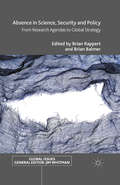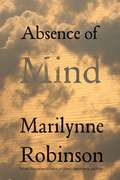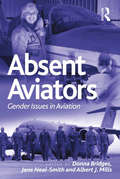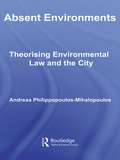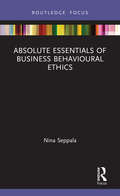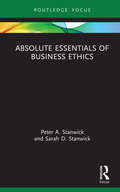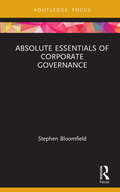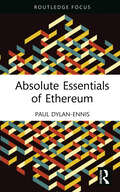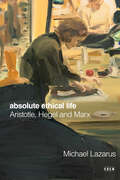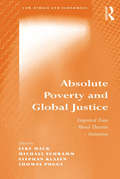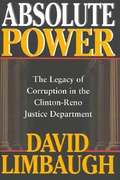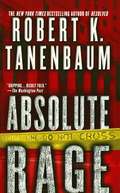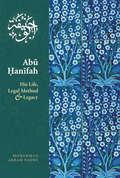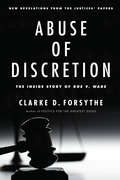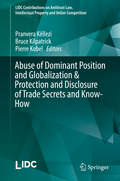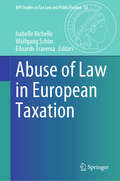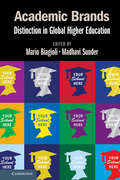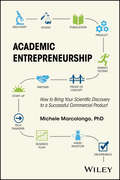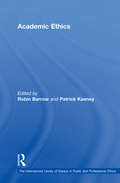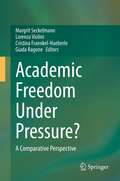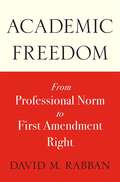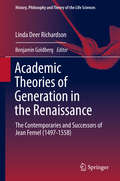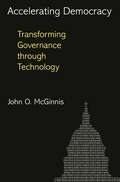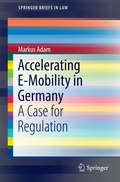- Table View
- List View
Absence in Science, Security and Policy: From Research Agendas to Global Strategy (Global Issues)
by Brian Rappert Brian BalmerThis book explores the absent and missing in debates about science and security. Through varied case studies, including biological and chemical weapons control, science journalism, nanotechnology research and neuroethics, the contributors explore how matters become absent, ignored or forgotten and the implications for ethics, policy and society.The chapter 'Sensing Absence: How to See What Isn't There in the Study of Science and Security' is open access under a CC BY 4.0 license via link.springer.com.
Absence of Mind: The Dispelling of Inwardness from the Modern Myth of the Self
by Marilynne RobinsonIn this ambitious book, acclaimed writer Marilynne Robinson applies her astute intellect to some of the most vexing topics in the history of human thought--science, religion, and consciousness. Crafted with the same care and insight as her award-winning novels, Absence of Mind challenges postmodern atheists who crusade against religion under the banner of science. In Robinson's view, scientific reasoning does not denote a sense of logical infallibility, as thinkers like Richard Dawkins might suggest. Instead, in its purest form, science represents a search for answers. It engages the problem of knowledge, an aspect of the mystery of consciousness, rather than providing a simple and final model of reality. By defending the importance of individual reflection, Robinson celebrates the power and variety of human consciousness in the tradition of William James. She explores the nature of subjectivity and considers the culture in which Sigmund Freud was situated and its influence on his model of self and civilization. Through keen interpretations of language, emotion, science, and poetry, Absence of Mind restores human consciousness to its central place in the religion-science debate.
Absent Aviators: Gender Issues in Aviation
by Donna BridgesThe objective of this book is to present a number of related chapters on the subject of gender issues in the workplace of the aviation industry. More specifically, the chapters address the continuing shortfall in the number of women pilots in both civilian and military aviation. Considerable research has been carried out on gender issues in the workplace and, for example, women represent about 10% of employees in engineering. This example is often used to show that the consequences of gender discrimination are embedded and difficult to overcome in masculine-dominated occupations. However, women represent only 5-6% of the profession of pilot. Clearly there are many factors which mitigate women seeking to become pilots. The chapters within this volume raise both theoretical and practical issues, endeavouring to address the imbalance of women pilots in this occupation. Absent Aviators consolidates a diverse range of issues from a number of authors from Australia, Austria, the United States, Canada, South Africa and the United Kingdom. Each of the chapters is research-based and aims to present a broad picture of gender issues in aviation, gendered workplaces and sociology, underpinned by sound theoretical perspectives and methodologies. One chapter additionally raises issues on the historical exclusion of race from an airline. The book will prove to be a valuable contribution to the debates on women in masculine-oriented occupations and a practical guide for the aviation industry to help overcome the looming shortfall of pilots. It is also hoped it will directly encourage young women to identify and overcome the barriers to becoming a civilian or military pilot.
Absent Environments: Theorising Environmental Law and the City (Law, Science and Society)
by Andreas Philippopoulos-MihalopoulosOffering a novel, transdisciplinary approach to environmental law, its principles, mechanics and context, as tested in its application to the urban environment, this book traces the conceptual and material absence of communication between the human and the natural and controversially includes such an absence within a system of law and a system of geography which effectively remain closed to environmental considerations. The book looks at Niklas Luhmann's theory of autopoiesis. Introducing the key concepts and operations, contextualizing them and opening them up to critical analysis. Indeed, in contrast to most discussions on autopoiesis, it proposes a radically different reading of the theory, in line with critical legal, political, sociological, urban and ecological theories, while drawing from writings by Husserl and Derrida, as well as Latour, Blanchot, Haraway, Agamben and Nancy. It explores a range of topics in the areas of environmental law and urban geography, including: environmental risk, environmental rights, the precautionary principle, intergenerational equity and urban waste discourses on community, nature, science and identity. The author redefines the traditional foundations of environmental law and urban geography and suggests a radical way of dealing with scientific ignorance, cultural differences and environmental degradation within the perceived need for legal delivery of certainty.
Absinthe: A Thriller
by Guido EekhautWalter Eekhaut (his name rhymes with "stakeout"), a veteran of the Belgian police force who has a problem with authority, is dispatched to Amsterdam to aid the Dutch security service in investigating the activities of a well-connected Russian oligarch, with connections to Putin. Some of the Russian's business is certainly legitimate, but some may well not be. In Amsterdam, Eekhaut is seconded to Chief Superintendent Alexandra Dewaal and her team, and begins to learn about the city's shady underside. He is at once pulled into another case, the murder of a young leftist dissident, alleged to have stolen a sensitive list from the Amsterdam offices of an ultra-right-wing political party-a list with the name of secret donors. The hunt for the killer leads to a knot of black money interests and illegal dealings that pit the Russian mob and Dutch politicians and business leaders against the police and anyone else who tries to get in their way. Absinthe is the gripping first installment in the bestselling Amsterdam trilogy featuring Eekhaut and Dewaal and, for North American readers, a new voice in European noir.
Absolute Essentials of Business Behavioural Ethics (Absolute Essentials of Business and Economics)
by Nina SeppalaBehavioural ethics in business is an emerging field that has challenged some of the established wisdom about ethics and added some truly new insights into our understanding about decision-making and behaviour. Why do seemingly responsible employees and managers sometimes act in bad ways? This book explains how people behave in real situations and what action can be taken to nudge behaviour in a more ethical direction. This concise textbook is ideal for use in the classroom as core or additional reading on courses in business ethics and corporate social responsibility; organisational behaviour and psychology; and any module with ethics content (for example, accounting ethics and strategic management). Each chapter is presented as a story with details about the experimental designs and related research findings. The key features include learning outcomes, suggested class activities, mock assessment questions, and an annotated list of key readings and these provide a one-stop text for tutors and students interested in this increasingly important area of study.
Absolute Essentials of Business Ethics (Absolute Essentials of Business and Economics)
by Peter Stanwick Sarah StanwickThis shortform textbook explores practical applications of how business ethics impacts working lives, allowing readers to reflect on their own moral compass through the use of ethical dilemmas. Highlighting the extensive breadth of issues related to business ethics, the authors introduce and analyze ethical and unethical behaviors of firms through numerous real -life examples including Patagonia, Costco, LVMH, Bill Gates, Muhummad Yunus, Enron, WorldCom, Samsung, Purdue Pharma, Vale Mining and the COVID-19 crisis. Regardless of career path or occupation, Absolute Essentials of Business Ethics is a valuable resource to understand why people make decisions based on their own ethical values and beliefs. Useful at both undergraduate and graduate levels, this unique textbook will serve students of business ethics around the world.
Absolute Essentials of Corporate Governance (Absolute Essentials of Business and Economics)
by Stephen BloomfieldThis shortform textbook, a concise overview of the development and current state of corporate governance, provides a critical narrative on the field.Beginning with insightful historical background, the author shows how value-adding corporate governance involves more than unthinking compliance to a recitation of statutes, regulations and principles, devoid of context. Features include basic definitions, reviews of theoretical governance problems, and a worldwide review of current governance provisions along with more detail on the UK situation. Revealing the geology of governance in the business world, the book highlights its progress set into a framework of regulation and law.This textbook provides a brief, authoritative summary of the field for two core audiences: as a reference for specialist readers, and as an concise introduction for non-specialist readers.
Absolute Essentials of Ethereum (Absolute Essentials of Business and Economics)
by Paul Dylan-EnnisAbsolute Essentials of Ethereum is a concise textbook which guides the reader through the fascinating world of the emerging Ethereum ecosystem, from the basics of how its blockchain works to cutting-edge applications.Written by an experienced educator, each chapter is designed to progress potential students from class to class. Technical concepts are clearly explained for those new to the topic and readers are supported with definitions and summaries in each chapter. Real-life case studies situate the overviews in a contemporary context. Topics covered include the Ethereum Execution and Consensus layers, Ethereum governance and community, Decentralised Autonomous Organisations (DAOs), Decentralised Finance (DeFi), Non-Fungible Tokens (NFTs) and Layer 2.This book is the ideal text to support undergraduate and postgraduate courses on blockchain technologies, cryptocurrencies, Web3 and fintech, as well as for those who want to know how Ethereum really works.
Absolute Ethical Life: Aristotle, Hegel and Marx (Currencies: New Thinking for Financial Times)
by Michael LazarusKarl Marx gave us not just a critique of the political economy of capital but a way of confronting the impoverished ethical quality of life we face under capitalism. Interpreting Marx anew as an ethical thinker, Absolute Ethical Life provides crucial resources for understanding how freedom and rational agency are impacted by a social world formed by value under capitalism, with consequences for philosophy today. Michael Lazarus situates Marx within a shared tradition of ethical inquiry, placing him in close dialogue with Aristotle and Hegel. Lazarus traces the ethical and political dimensions of Marx's work missed by Hannah Arendt and Alasdair MacIntyre, two of the most profound critics of modern politics and ethics. Ultimately, the book claims that Marx's value-form theory is both a continuation of Aristotelian and Hegelian themes and at the same time his most distinctive theoretical achievement. In this normative interpretation of Marx, Lazarus integrates recent moral philosophy with a historically specific analysis of capitalism as a social form of life. He challenges contemporary political and economic theory to insist that any conception of modern life needs to account for capitalism. With a robust critique of capitalism derived from the determinations of what Marx calls the "form of value," Lazarus argues for an ethical life beyond capital.
Absolute Poverty and Global Justice: Empirical Data - Moral Theories - Initiatives (Law, Ethics and Economics)
by Thomas Pogge Michael SchrammAbsolute poverty causes about one third of all human deaths, some 18 million annually, and blights billions of lives with hunger and disease. Developing universalizable norms aimed at tackling absolute poverty and the complex and multilayered problems associated with it, this book considers the levels, trends and determinants of absolute poverty and global inequality. Examining whether much faster progress against absolute poverty is possible through reductions in national and global inequalities that produce economic growth for poor countries and households, this book suggests that diverse moral views imply that international agencies as well as the citizens, corporations and governments of affluent countries bear a moral responsibility to reduce absolute poverty. In considering strategies of eradication through specific policies and structural reforms it is argued that because of its moral importance and requirement for only modest efforts and resources, the goal of overcoming absolute poverty must be given much higher political priority by international agencies and governments of affluent countries. Suggesting that these agencies should be encouraged to facilitate and promote new initiatives, this book concludes with a discussion of how such initiatives might be realized.
Absolute Power: The Legacy of Corruption in the Clinton-Reno Justice Department
by David LimbaughLimbaugh, a nationally syndicated columnist and a political commentator, shows how federal law was politicized and precedents were set for a legal war against the rule of law and the traditional civil liberties of the US during the Clinton administration, beginning with Clinton's appointment of Janet Reno as attorney general. The author is brother of radio talk-show host Rush Limbaugh. Annotation c. Book News, Inc., Portland, OR (booknews.com)
Absolute Rage (A Butch Karp-Marlene Ciampi Thriller #14)
by Robert K. TanenbaumNew York Times bestselling author Robert K. Tanenbaum delivers his grittiest, most ethically challenging thriller yet, as New York chief assistant district attorney Butch Karp fights for his family in the wilds of West Virginia's coal mining country. While New York City sizzles beneath a blanket of early summer humidity, the Karp family is happily taking refuge in their renovated farmhouse on Long Island's north shore. Karp's battles against the City's corrupt politicians are never-ending. His wife, Marlene, is training guard dogs on their picturesque acreage; Lucy is enjoying her summer break from Boston College and playing the part of the dutiful daughter, assisting with the running of the business and tending to her rambunctious twin brothers. The tide quickly changes, however, when Marlene befriends her beachside neighbor, Rose Wickham-Heeney, a northeastern aristocrat turned wife of West Virginia coal mine union leader Ralph ³Red² Heeney. Soon after the fun-filled weeks of family barbecues and lazy afternoons with the Heeneys, the Karps discover that Rose, Red, and their daughter, Lizzie, have been brutally murdered back home in McCullensburg. Irresistible force meets immovable object when the West Virginia governor appoints Karp as special prosecutor to bring justice to the corrupt town, its union chieftain, and his band of merry thugs. Marlene joins Karp as he searches for the killers and works to save his own family from an evil that runs as deep as the mines that fuel it.
Abu Hanifah
by Mohammed Akram NadwiAbu Hanifah Nu'man ibn Thabit was one of the greatest pioneers in the history of Islamic Law, particularly in legal reasoning. The Hanafi Legal School that he founded has become the most widely followed among the world's Muslims. Based on primary sources, this study of the life and legacy of Abu Hanifah also surveys the evolution of Hanafi legal reasoning (fiqh) in different regions of the Islamic world and assesses its historical distinctiveness.Mohammed Akram Nadwi is a research fellow at the Oxford Centre for Islamic Studies, and is the author of several works including al-Muhaddithat: the Women Scholars in Islam (2007).
Abuse of Discretion
by Clarke D. ForsytheBased on 20 years of research, including an examination of the papers of eight of the nine Justices who voted in Roe v. Wade and Doe v. Bolton, Abuse of Discretion is a critical review of the behind-the-scenes deliberations that went into the Supreme Court's abortion decisions and how the mistakes made by the Justices in 1971-1973 have led to the turmoil we see today in legislation, politics, and public health. The first half of the book looks at the mistakes made by the Justices, based on the case files, the oral arguments, and the Justices' papers. The second half of the book critically examines the unintended consequences of the abortion decisions in law, politics, and women's health.Why do the abortion decisions remain so controversial after almost 40 years, despite more than 50,000,000 abortions, numerous presidential elections, and a complete turnover in the Justices? Why did such a sweeping decision-with such important consequences for public health, producing such prolonged political turmoil-come from the Supreme Court in 1973? Answering those questions is the aim of this book. The controversy over the abortion decisions has hardly subsided, and the reasons why are to be found in the Justices' deliberations in 1971-1972 that resulted in the unprecedented decision they issued.Discuss Abuse of Discretion on Twitter using hashtag #AbuseOfDiscretion.
Abuse of Dominant Position and Globalization & Protection and Disclosure of Trade Secrets and Know-How (LIDC Contributions on Antitrust Law, Intellectual Property and Unfair Competition)
by Bruce Kilpatrick Pierre Kobel Pranvera KëlleziThis publication provides an unparalleled comparative analysis of two "hot topics" in the field of antitrust and unfair competition law with regard to a number of key countries. The first part of the book examines the prohibition of abuse of a dominant position and globalization in relation to two broad questions: first, whether there is consistency between the approaches of different jurisdictions to the notion of abuse, and, second, whether there are too many restrictions on legal rights and business opportunities resulting from the prohibition of abuse of dominance. The international report drafted by Professor Pinar Akman reveals that there are as many similarities as differences between the approaches of the twenty-one jurisdictions studied and presented in this book. This is an invitation to read the excellent international report as well as the reports on specific jurisdictions in order to grasp the variety of arguments and approaches of this antitrust area, which may, on the surface, appear alike. The second part gathers contributions on the question of protection and disclosure of trade secrets and know-how from various jurisdictions. The need for adequate protection of trade secrets has increased due to digitalization and the ease with which large volumes of misappropriated information can be reproduced. The comprehensive international report, prepared by Henrik Bengtsson, brings together these reflections by comparing various national positions. The book also discusses the resolutions passed by the General Assembly of the International League of Competition Law (LIDC) following a debate on each of these topics, and includes proposed solutions and recommendations.
Abuse of Law in European Taxation (MPI Studies in Tax Law and Public Finance #12)
by Wolfgang Schön Isabelle Richelle Edoardo TraversaThis book explores the meaning and the impact of the concept of abuse of law in European taxation. Fighting abusive arrangements has gained prominence along three different dimensions: as a methodological tool to constrain access to tax benefits under EU law, as a ground of justification for disadvantageous treatment of cross-border activities and investment, and as a policy goal underlying recent EU tax legislation. The contributors to this book—leading academics and practitioners from different European countries—discuss the most burning issues concerning the prohibition of abuse in tax matters. Starting from a general clarification of notions like &‘tax avoidance&’ and &‘aggressive tax planning&’ and informed by a deep-diving comparative analysis of the concept of &‘abuse&’, the authors examine special anti-avoidance rules both in EU legislation on indirect taxes and under the existing EU corporate tax directives. Furthermore, the authors shed a critical light on the effect of European fundamental freedoms on national anti-abuse provisions. Last but not least the impact of the recently introduced Global Minimum Tax (GloBE) on the operation of anti-abuse rules receives scrutiny. In the end, the book tries to answer whether these different fields of application are informed by a unified notion of fiscal abuse. Given the world-wide momentum behind the fight against fiscal fraud and tax avoidance, the analytical approach of this book, bringing together different strands of legislature and jurisprudence, will be of substantial value for the work of both practitioners and scholars in the field of EU taxation.
Academic Brands: Distinction in Global Higher Education
by Mario Biagioli Madhavi SunderThe first comprehensive analysis of the emergence of academic brands, this book explores how the modern university is being transformed in an increasingly global economy of higher education where luxury is replacing access. More than just a sign of corporatization and privatization, academic brands provide a unique window on the university's concerns and struggles with conveying 'excellence' and reputation in a competitive landscape organized by rankings, while also capitalizing on its brand to generate revenue when state support dwindles. This multidisciplinary volume addresses topics including the uniqueness of academic brands, their role in the global brand economy of distinction, and their vulnerability to problematic social and political associations. By focusing on brands, the volume analyzes the tensions between the university's traditional commitment to public interest values – education, research, and the production of knowledge – and its increasingly managerial culture framed by corporate, private values. Available as Open Access on Cambridge Core.
Academic Entrepreneurship: How to Bring Your Scientific Discovery to a Successful Commercial Product
by Michele MarcolongoThe pathway to bringing laboratory discoveries to market is poorly understood and generally new to many academics. This book serves as an easy-to-read roadmap for translating technology to a product launch – guiding university faculty and graduate students on launching a start-up company.• Addresses a growing trend of academic faculty commercializing their discoveries, especially those supported by the National Science Foundation and National Institutes of Health• Offers faculty a pathway and easy-to-follow steps towards determining whether their discovery / idea / technology is viable from a business perspective, as well as how to execute the necessary steps to create and launch a start-up company• Has a light-hearted and accessible style of a step-by-step guide to help graduate students, post-docs, and faculty learn how to go about spinning out their research from the lab• Includes interviews by faculty in the disciplines of materials science, pharmaceuticals, medical devices, information technology, energy, and mechanical devices – offering tips and discussing potential pitfalls to be avoided
Academic Ethics (The International Library of Essays in Public and Professional Ethics)
by Patrick KeeneyAcademic ethics are currently much in the news but there is a great deal of uncertainty, both as to what constitutes specifically academic ethics and about a number of issues that are taken to be issues of academic ethics. This collection of papers focuses on both questions, moving from consideration of the very idea of a University and what that entails, via attempts to locate the major current concerns, to particular issues relating to the University's relations with the corporate world, the professor's role, relations between student and teacher, credentialling, the demands of collegiality and plagiarism. The editors have provided both a full and reasoned introduction and a critical end-piece that attempt to bring some order to the often inchoate nature of this field, raising the further question of whether institutions should, or should not, frame formal codes of conduct. The selected papers are drawn from diverse sources and together provide one of the first comprehensive overviews of academic ethics.
Academic Freedom Under Pressure?: A Comparative Perspective
by Lorenza Violini Margrit Seckelmann Cristina Fraenkel-Haeberle Giada RagoneIs academic freedom threatened? The book examines current challenges to academic freedom in Europe, focusing mainly on Italy and Germany. The cases discussed demonstrate that research and teaching are under pressure in European democracies: in Hungary and Poland due to political constraints, in other countries due to societal expectations. Considering different interrelated aspects, the four parts of the book explore many real and potential threats to universities, scientific institutions and researchers, ranging from the European dimension of freedom of the arts and sciences to comparative analysis of emerging challenges to academic freedom against the backdrop of the COVID-19 pandemic. They highlight threats to university autonomy from the economic orientation of university governance, which emphasizes efficiency, competition, and external evaluation, and from new rules concerning trigger warnings, speech restrictions, and ethics commissions. Detailed study of these complex threats is intended to stimulate scholarly reflection and elicit serious discussion at European and national level. The volume contributes to the search for a new role of universities and scientific institutions and is addressed to academics and political stakeholders.
Academic Freedom: From Professional Norm to First Amendment Right
by David M. Rabban“The best kind of scholarship—deeply researched and immensely useful. Wherever you stand on issues of free speech and academic freedom, you will learn from this book.” —Michael Roth, President of Wesleyan University and author of Safe Enough SpacesA definitive interpretation of academic freedom as a First Amendment right, drawing on a comprehensive survey of legal cases.Is academic freedom a First Amendment right? Many think so, yet its relationship to free speech as guaranteed by the Constitution is anything but straightforward. David Rabban examines the extensive case law addressing academic freedom and free speech at American universities, developing a robust theory of academic freedom as a distinctive subset of First Amendment law.In subsuming academic freedom under the First Amendment, Rabban emphasizes the societal value of the contribution to knowledge made by the expert speech of professors, the classic justification for academic freedom in the influential 1915 Declaration of the American Association of University Professors (AAUP). Any indication that professors might be disciplined because people without academic training disagree with their scholarly views would undermine confidence in the integrity of their work and therefore their ability to perform this vital function on behalf of the public. Rabban argues that academic freedom fosters two central First Amendment values recognized by courts in a wide range of contexts: the production and dissemination of knowledge and the contribution of free expression to democratic citizenship.The First Amendment right of academic freedom applies most directly to professors, but it also plausibly extends to the educational decisions of universities and to students’ learning interests. More broadly, this vision of academic freedom can guide in developing additional distinctive First Amendment rights to protect the expert expression of journalists, librarians, museum curators, and other professionals. At a time when academic freedom is under attack from many directions, Academic Freedom proposes a theoretically satisfying and practically useful guide to its meaning as a First Amendment right.
Academic Theories of Generation in the Renaissance: The Contemporaries and Successors of Jean Fernel (1497-1558) (History, Philosophy and Theory of the Life Sciences #22)
by Benjamin Goldberg Linda Deer RichardsonThis volume deals with philosophically grounded theories of animal generation as found in two different traditions: one, deriving primarily from Aristotelian natural philosophy and specifically from his Generation of Animals; and another, deriving from two related medical traditions, the Hippocratic and the Galenic. The book contains a classification and critique of works that touch on the history of embryology and animal generation written before 1980. It also contains translations of key sections of the works on which it is focused. It looks at two different scholarly communities: the physicians (medici) and philosophers (philosophi), that share a set of textual resources and philosophical lineages, as well as a shared problem (explaining animal generation), but that nevertheless have different concerns and commitments. The book demonstrates how those working in these two traditions not only shared a common philosophical background in the arts curricula of the universities, but were in constant intercourse with each other. This book presents a test case of how scholarly communities differentiate themselves from each other through methods of argument, empirical investigation, and textual interpretations. It is all the more interesting because the two communities under investigation have so much in common and yet, in the end, are distinct in a number of important ways.
Accelerating Democracy: Transforming Governance Through Technology
by John O. McGinnisHow to adapt democracy to the accelerating pace of technological change—and why it's critical that we doSuccessful democracies throughout history—from ancient Athens to Britain on the cusp of the industrial age—have used the technology of their time to gather information for better governance. Our challenge is no different today, but it is more urgent because the accelerating pace of technological change creates potentially enormous dangers as well as benefits. Accelerating Democracy shows how to adapt democracy to new information technologies that can enhance political decision making and enable us to navigate the social rapids ahead.John O. McGinnis demonstrates how these new technologies combine to address a problem as old as democracy itself--how to help citizens better evaluate the consequences of their political choices. As society became more complex in the nineteenth century, social planning became a top-down enterprise delegated to experts and bureaucrats. Today, technology increasingly permits information to bubble up from below and filter through more dispersed and competitive sources. McGinnis explains how to use fast-evolving information technologies to more effectively analyze past public policy, bring unprecedented intensity of scrutiny to current policy proposals, and more accurately predict the results of future policy. But he argues that we can do so only if government keeps pace with technological change. For instance, it must revive federalism to permit different jurisdictions to test different policies so that their results can be evaluated, and it must legalize information markets to permit people to bet on what the consequences of a policy will be even before that policy is implemented.Accelerating Democracy reveals how we can achieve a democracy that is informed by expertise and social-scientific knowledge while shedding the arrogance and insularity of a technocracy.
Accelerating E-Mobility in Germany: A Case for Regulation (SpringerBriefs in Law)
by Markus AdamThis book tackles the problem of the insufficient and expensive charging infrastructure in Germany. It assesses the lack of charging infrastructure for electric vehicles with regard to regulatory and competition law, as well as economic aspects. The legal solutions proposed here could ultimately serve to offer e-motorists around the country highly efficient and competitively priced charging options.
